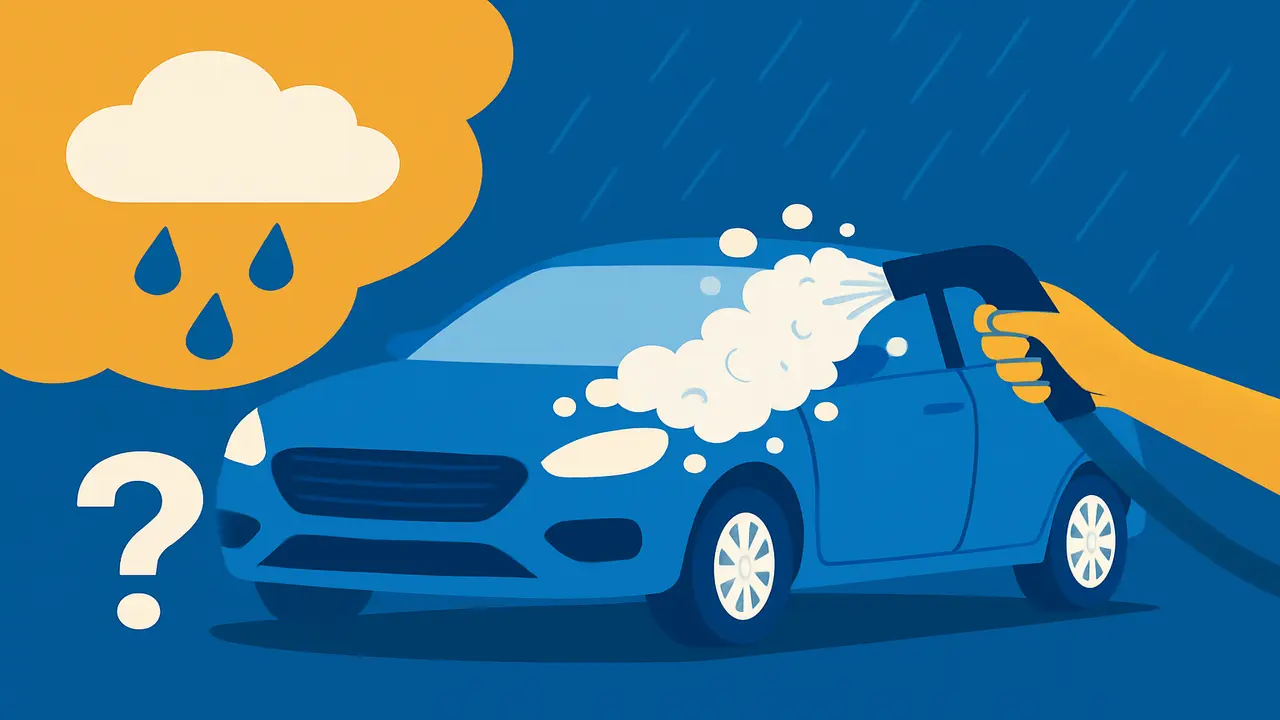The Lingering Danger: Your car may appear cleaner immediately after a refreshing downpour, but appearances can be deceptive. Even though rain removes loose dirt from the surface, experts strongly advise washing your vehicle right away. This is about more than just looking good; it’s also about keeping the paint and finish on your car safe from potentially damaging elements that the rain, which seems to be harmless, leaves behind. When rain falls, it collects pollutants and contaminants from the air, causing Acid Rain. This can have damaging effects, as seen in the photo to the left, where dried rain has etched into the paint of a car, causing defects.
Rain’s Hidden Residue.
The Illusion of Cleanliness Rainwater, especially in urban and industrial areas, is far from pure. Dust, pollen, industrial waste, and even acidic compounds like sulfur dioxide and nitrogen oxides are among the pollutants it collects as it travels through the atmosphere. When the rain evaporates, these contaminants are left behind on your car’s surface as a thin, often invisible film. This residue isn’t just unsightly; it can be corrosive over time, potentially dulling your paint and even etching the clear coat.
Mineral Deposits and Acid Rain Threat.
The possibility of acid rain poses a significant threat to automobile owners in locations with a lot of industrial activity or high levels of air pollution. Acid rain, with its high concentrations of sulfuric and nitric acids, has the potential to permanently etch and fade the paint on your car. Even in areas without severe acid rain, the minerals present in rainwater, particularly calcium and magnesium, can leave behind stubborn water spots that are difficult to remove and can also compromise the paint’s shine if left untreated for extended periods.
The Stiff Situation.
Contaminant Binding When rainwater dries on your car’s surface, the dissolved contaminants become more concentrated and can bind strongly to the paint. As a result, it is much more challenging to remove them later on with a simple rinse. The longer these pollutants remain in contact with your car’s finish, the greater the potential for damage. This binding process can be avoided by regularly washing after rain, making subsequent cleaning much simpler and more effective
Protecting Your Car’s Clear Coat: The First Line of Defense:
The clear coat on your car is an essential layer of protection for the paint underneath. It prevents the color from fading when exposed to UV light and protects it from environmental contaminants. Over time, rainwater residue may compromise this clear coat’s integrity. By washing your car after rain, you are essentially removing these harmful substances before they have a chance to degrade the clear coat, thus preserving the longevity and vibrancy of your car’s paint.
Preventing Long-Term Damage.
It may appear to be a minor issue not to wash your car after it rains, but the accumulation of these contaminants can cause significant damage over time. Etched paint, stubborn water spots, and a dull finish can diminish your car’s aesthetic appeal and negatively impact its resale value. Performing post-rain washes regularly is a proactive way to safeguard your investment and keep your vehicle in pristine condition for many years to come.
Expert Recommendation.
Automotive experts and detailing professionals consistently advise washing your car shortly after a rainfall. The potentially harmful residue is effectively removed through this proactive approach before it can cling to the paint or cause corrosion. While a quick rinse might seem sufficient, a proper wash with car-specific soap and a thorough drying is recommended to ensure all contaminants are removed and to prevent water spots.
Conclusion.
Wash Your Car! Don’t Let the Rain Fool You! While a rain shower might give the illusion of a clean car, the reality is that it often leaves behind a cocktail of harmful contaminants that can damage your vehicle’s paint and finish over time. To remove this residue, prevent etching and water spots, protect the clear coat, and ultimately maintain your vehicle’s value, experts strongly recommend washing it right after it rains. If you want your paint to last for a long time, a thorough wash is essential, so don’t let the rain’s appearance fool you.
Also Read
- Audi GT50 Concept: A Loud Reminder of Why Car Enthusiasts Fell in Love With Audi
- Nearly 30% of UK Drivers Believe Car Tax Should Be Based on Mileage — Survey
- Why Planes and Boats Escaped the Luxury Tax But Cars Didn’t
- Australia’s Headlight Confusion: Authorities Warn Drivers After Viral $250 Headlight Rule Goes Wild Online
- 2025 Hyundai Venue Facelift Launched in India – Full Details, Variants, and Price
